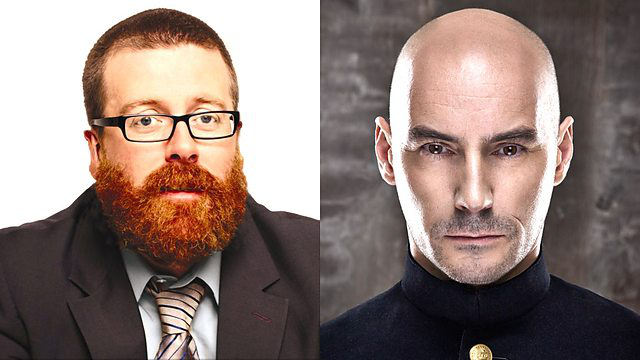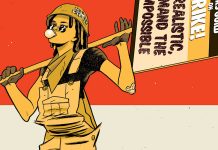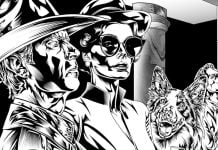Back in November, three Glaswegians gathered at a comedy club in Scotland’s largest city to interview each other for that most venerable of institutions, the BBC. The recordings are now live, and this Beat regular just happened to be in the audience…

Not unsurprisingly, that session has been heavily cut to edit around the creative swearing, but it’s well worth a listen if you only know of the stage persona side of Boyle or his twitter spats.
Next up was Grant Morrison, to be interviewed by Boyle. Admitting that he was nervous at appearing after and alongside such well known comedians, the amusing and intellectual tones carried over from one show to the other nonetheless.
The entire interview can be listened to in full here!
Morrison is often a bit nervous when speaking in public, until he gets into the swing of things at least. Here though he had the benefit of both an interviewer and audience that were tuned into the dry and daft Scottish sense of humour, with Boyle asking some great questions that were still very accessible to a more general audience.
Boyle begins by asking Morrison how he got into comics, which leads to Grant talking about Captain Clyde, his first newspaper comic strip about “an unemployed Glasgow superhero” with a severe lack of ambition. Featuring characters like the Blue Phantom, “who sounds like a sex pest”, and the Chimpions – chimpanzee superheroes of course – Morrison expresses amazement that the strip ran as long as it did alongside the tv listings, given the content of “skull faced horrors” and “baby eating demons”.
Talking a little about other creators’ wish to transcend the comics medium with superhero stories, Boyle invites Morrison to talk about his own feelings on cape books. As in Supergods, Morrison speaks about “adding to the continuity of Superman and Batman” and that the icons have inevitably been through extreme changes in their lives, as they “constantly always represented what people are into at any one time.”
Looking at Supergods, Boyle comments that it’s an interesting mix of history and autobiography as the latter elements only pop up around halfway through the book. Morrison explains that he “treated [him]self as part of the story of comic books”, appearing around the same time as the Flash and always running to try and keep up.
He’s not so much a fan of taking comics literally though, laughing that “Batman could never be real, it’s just stupid.” Boyle points out that given the escape statistics at Arkham Asylum they should really consider moving it outwith Gotham. Morrison replies that it should be in space, but agrees that reformation is pretty unlikely for some inmates – “you can’t even explain the meaning of reforming to a giant crocodile!”
Morrison disagrees with the idea that superhero stories can’t carry greater messages as the power of superheroes as symbols is so strong. “Batman can carry all kinds of weight,” he explains, citing how his various superhero stories have dealt with existential fear, grief and loss, and feminism and mother/daughter relationships in his upcoming Wonder Woman book.
Asked about the area in which he lives, a town outside Glasgow, Morrison laughs that “Dunoon on a friday night is more dangerous than gotham, the real truth is batman would last five minutes on the high street!”
The Invisibles and The Filth are up next, as Boyle explains how important the former book was to him in introducing him to new concepts and ideas, and that the latter is also a favourite. Morrison talks here about his travels post-Arkham Asylum, when he wrote The Invisibles and went about rediscovering himself via “the systematic derangement of the senses.” Coming home to late ’90s Britain after that, was akin to a “post-ecstasy comedown”.
There’s some interesting talk about one scene in The Filth, inspired by the real-life ’50s experiments by John B Calhoun on behaviours in overcrowded population densities, and the emergence of the bizarre “beautiful ones” that such situations create as society collapses around them.
Moving on to the internet, Morrison describes how it has homogenised people who would previously have been able to “grow in the dark like mushrooms behind the radiator”, as we all smooth each others’ edges. Sexy phones and radio telepathy are discussed by both, before addressing why police and rebel groups are in constant clashes, with “complete ideological audiences attracted to each other”.
A casual reader of The Invisibles, says Boyle, might lead people to suspect Morrison is a fan of conspiracy theories. Morrison thinks no such thing though, describing conspiracy theories as a “secular alternative to religion” for people desperate to escape the harsh truth – “nobody’s in charge, that’s the terrifying story”.
Asked if he’s been following the news about the NSA and email surveillance, Morrison laughs – “I follow nothing to do with reality! I can tell you right now what’s happening in Spider-Man’s life or in Superman’s life but ask me are we being watched? I don’t know.” He goes on to say that because politicians and those with power are always plotting they assume others are up to things as well.
There’s some talk on how stories teach us how to behave, before Boyle asks if Morrison thinks there is any merit to Rupert Sheldrake’s theory on morphic fields of information, and Jung’s idea of the collective consciousness to explain where stories come from.
“Naw, I think he’s talking shite man,” Morrison laughs. He explains that he is often asked where he gets his ideas from and can only reply, “I look in my head and I find them, that’s what I get paid for! They’re in my head, where else are they gonna be?!”
“Ideas are easy to construct, I don’t think they float about in an ether or idea-space,” he adds.
Asked about his interest in chaos magic, Boyle is interested in whether he still practices it. “Yeah I do it all the time, I did it before I came in here actually,” Morrison answers, before adding with a laugh, “and now you’re all under my spell!”. He went on to talk about how he’d first got into magic as a straight edge mod kid thanks to his uncle’s tarot cards. There’s a fair bit here for fans who enjoy hearing Grant talk about his practices and beliefs, and some thinking on how our universe is perhaps grown in a five dimensional liquid continuum (ie the stuff that often gets cut from plain old comics interviews!).
Finishing with a few words on Wonder Woman, Morrison reveals that the “first 60 pages have no guys at all”, as the book focuses on a culture and society built entirely by women with no input from men whatsoever.
Well actually this interview finishes with a surreal mention of a boy’s buttocks, but I’ll let you hear that one for yourself!
Unlike the previous recording of Bridges and Boyle, there was no need to keep trying for more material – probably because there was far less swearing!
Next in the chain, Morrison has interviewed writer, musician and ex-Python Neil Innes for broadcast on the 14th of January.
Laura Sneddon is a comics journalist and academic, writing for the mainstream UK press with a particular focus on women and feminism in comics. Currently working on a PhD, do not offend her chair leg of truth; it is wise and terrible. Her writing is indexed at comicbookgrrrl.com and procrastinated upon via @thalestral on Twitter.







I listened to this last night on IPlayer with my wife. She had heard of Grant Morrison (we have been married a long time) but she hadn’t read any of his work, but she thought that the show was pretty cool and is now interested in reading Supergods at some point.
Frankie Boyle, an old school comedian harking back mto playground jokes circa 1966 and the Aberfan disaster: “What’s black and goes to school? A slagheap.”
Funny as cancer, should be under house arrest,shite interviewer.
Morrison quite amusing on comic book topics, decidedly disappointing elsewhere. “No-one is in charge”. Correcto! It is not an Orwellian world, but Pynchonesque. Factionality is no less dangerous, an oligopoly of totalitarianism.
Best quote: “I follow nothing to do with reality” That should always be his tag line…or a T-shirt.
“A casual reader of The Invisibles, says Boyle, might lead people to suspect Morrison is a fan of conspiracy theories. Morrison thinks no such thing though, describing conspiracy theories as a “secular alternative to religion” for people desperate to escape the harsh truth – “nobody’s in charge, that’s the terrifying story”.”
The the very next thing he says after being asked if he’s been following the news about the NSA and email surveillance: “I follow nothing to do with reality! I can tell you right now what’s happening in Spider-Man’s life or in Superman’s life but ask me are we being watched? I don’t know.”
Then he goes on to say that because politicians and those with power are always plotting they assume others are up to things as well.
A true shite talker.
Grant Morrison Disinfo Con Lecture – https://www.youtube.com/watch?v=l-cxBuRU09w
Comments are closed.